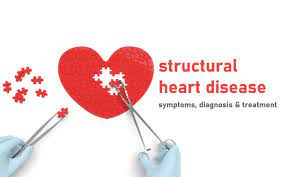Structural heart disease is a condition in which a patient’s heart valves or chambers are compromised due to inherited (congenital) or acquired defects, or both. Although many structural heart conditions are present at birth, they can also develop later in life as a result of an infection, ageing, or another underlying condition
Conclusions
According to Best Structural Heart Interventionist in Apollo Hospital Delhi Interventions in structural heart disease include a wide range of cardiac procedures for congenital and acquired diseases such as valvular diseases, septal defects, arterial or venous obstructions, and fistulas, as well as a variety of techniques such as atrial appendage closure. The positive outcomes of transcatheter valve therapy have piqued the interest of cardiologists in this field. When combined with device development and continuous improvement, this situation portends a bright future for this sub specialty of cardiac intervention.
Heart Structural Disorders
Best Structural Heart Interventionist in Delhi We treat a variety of structural heart conditions, including:
• Aortic regurgitation occurs when the aortic valve leaks, allowing blood to return to the heart.
• Mitral Stenosis: A narrowing of the mitral valve that prevents blood from entering the heart’s pumping chamber.
• Mitral regurgitation occurs when the mitral valve leaks, allowing blood to flow backwards into the lungs.
• A narrowed or leaky pulmonary valve is referred to as pulmonary valve disease.
• Tricuspid Valve Disease: A tricuspid valve that is narrowed or leaky.
• Patients with previous surgical bioprosthetic heart valves that have become damaged are considered to have defective bioprosthetic heart valves.
• A congenital defect in which a hole forms in the tissue separating the upper chambers of the heart. It has been linked to stroke patients.
• A congenital defect in which a hole has formed in the tissue separating the upper chambers of the heart. It has been linked to stroke patients.
• A Ventricular Septal Defect is a gap in the tissue that separates the lower chambers of the heart.
• Paravalvular Leaks: Blood leaks around the surgically implanted valve in patients with surgical valve replacement.
• Hypertrophic Obstructive Cardiomyopathy: A condition in which the heart muscle thickens abnormally, making it difficult for the heart to pump blood.
For any problem regarding your heart valve you need a Best Structural Heart Interventionist in Delhi for best results . You can meet Dr Vivek Kumar Senior Consultant Interventional Cardiology & Cardiac Electrophysiology at Indraprastha Apollo Hospitals, Sarita Vihar, New Delhi.
